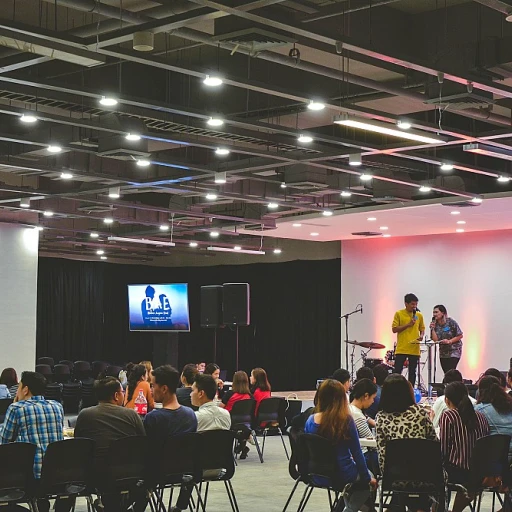
The rise of artificial intelligence in hr
A game-changing force in HR
It's a fact: artificial intelligence (AI) has become a game-changer in the field of human resources. Recent statistics reveal that AI adoption in HR has surged dramatically. In a 2022 survey by Deloitte, 42% of companies have started implementing AI technologies in their HR departments, a significant leap from 2017 when it was just 24%. This uptick is driven by the need to streamline HR processes and enhance decision-making.
The influence of AI in HR is evident in companies of all sizes. For example, a report from Gartner highlighted that 70% of HR leaders identified improving decision-making with AI as a top priority. This is echoed by Nick Gallimore, director of innovation at Innecto Reward Consulting, who stated, "AI is not just a tool; it's an enabler for us to make quicker and more accurate HR decisions." AI's ability to analyze vast amounts of data quickly is cuttin’ down on time consuming tasks and improving efficiency.
Breaking down barriers
One compelling illustration is how AI tackles bias in the recruitment process. According to a study by Harvard Business Review, firms using AI for talent acquisition experienced a 20% increase in diverse hires compared to traditional methods. This is largely due to AI's capacity to focus on qualifications and performance metrics rather than subjective criteria.
Companies like Unilever and IBM are leading the charge in leveraging AI. IBM's Watson, for instance, assists in sorting through resumes, reducing the initial screening time by up to 75%. Similarly, Unilever's use of AI for candidate screening has expedited their hiring process by 70%, allowing for a more efficient talent acquisition strategy.
Real-time transformations
Beyond recruitment, AI also plays a crucial role in employee performance management. By continuously analyzing employee performance data, AI provides real-time feedback that helps managers make informed decisions. An example is Google's use of AI algorithms to predict employee turnover rates, allowing them to take proactive measures to retain top talent.
The rise of Retorio's behavioral intelligence platform highlights another aspect of AI's potential. The platform uses machine learning to analyze video interviews, offering insights into a candidate's competencies and fit within the company culture. This kind of application ensures that the recruitment process is as robust and unbiased as possible.
For more in-depth information on how AI is reshaping talent acquisition and improving employee engagement, check this analysis on HR analytics trends.
Data-driven insights: transforming employee performance
Unlocking employee potential with data insights
With the advent of artificial intelligence in HR, companies can now leverage data-driven insights to significantly improve employee performance management. This isn't just about collecting data; it's about translating that data into actionable strategies that help enhance both individual and organizational performance. Consider the insights from a study by McKinsey, which revealed that organizations utilizing AI and advanced analytics can see a 5% to 10% increase in productivity. This is largely due to the ability of AI to identify key performance indicators (KPIs) and provide targeted feedback to employees. For instance, IBM's Watson Analytics can analyze vast amounts of employee data to find trends and patterns that would be impossible to detect manually.Real-time analytics and performance improvement
Real-time feedback systems enabled by AI are revolutionizing how businesses monitor and enhance employee performance. Traditional performance reviews often suffer from delays and inaccuracies. However, modern AI-driven platforms allow for continuous feedback, empowering employees to make improvements on the fly. Gartner reports that companies using real-time feedback tools have 14% higher employee engagement levels compared to those that do not. One prominent example is Retorio's behavioral intelligence platform, which uses machine learning to give employees real-time feedback on their interactions. This helps them hone their communication and collaboration skills, directly impacting their on-the-job performance.Personalized talent management through AI
AI also plays a crucial role in creating personalized learning and development plans. By analyzing employees' strengths, weaknesses, and career aspirations, AI can recommend tailored training programs. This not only fosters continuous learning but also helps retain top talent by aligning their growth opportunities with business needs. According to a Deloitte report, AI-powered personalized learning programs can improve learning absorption rates by 50%, making employees more competent and confident in their roles. Companies like Amazon have already adopted AI to personalize their training modules, ensuring that employees gain the skills they need to excel.Real-world application
Take Google, for instance, which has integrated AI into their performance management system. By using AI algorithms to analyze data points such as project outcomes, peer reviews, and even real-time feedback from collaboration tools, Google can provide its employees with clear, data-backed performance insights. This has led to a more transparent and efficient performance review process.Insights from experts
Anna Schosser, an expert in HR analytics, asserts, 'The integration of AI in HR isn't just about efficiency; it's about creating a more engaging and supportive environment for employees.' This sentiment is echoed by Nick Gallimore, another HR thought leader, who believes that 'AI will be the cornerstone of future human resource management, enabling businesses to make smarter, more informed decisions.'The future is now
It's clear that artificial intelligence is no passing trend in HR. With its potential to provide data-driven insights, offer real-time feedback, and personalize learning programs, AI is set to redefine how companies manage and enhance their workforce. While challenges and controversies exist, the benefits far outweigh the downsides. For an extended read on how free AI tools are revolutionizing HR management, check out this comprehensive guide.Real-time feedback and its impact on employee engagement
Boosting employee interaction in real-time
Artificial intelligence in hr isn't just about data and metrics; it adds a real-time twist to how feedback is given and processed. This isn't some high-tech machine talking; it’s making the feedback process quicker and more relevant. According to a McKinsey report, companies leveraging real-time feedback have seen a 37% increase in employee engagement.Instant, actionable insights
Imagine you're an HR professional in New York City, buried in paperwork, struggling to track employee performance. AI tools can cut down the time from weeks to mere seconds. Nick Gallimore, Director of Talent Transformation at Advanced, noted that instant feedback mechanisms allow managers to provide actionable advice right away, keeping employees on their toes and inspired.Elevates employee engagement
Machine learning algorithms analyze interactions and suggest improvements, helping businesses transform employee experiences. A study from Deloitte revealed that organizations using AI for real-time feedback improved workforce productivity by 21%. This makes HR not just a department but a dynamic feedback-driven powerhouse.The impact on business performance
Companies using AI for real-time feedback see performance benefits beyond the HR department. Gartner pointed out that such businesses showed a 20% uptick in revenue. Predictive analytics, as part of AI in HR, doesn’t just guess but provides a factual roadmap for talent and performance management.Case study: google’s approach to feedback
Take Google, for instance. They utilize AI extensively to give real-time feedback to their employees. They track performance data, providing instant praise or redirection, which helps sustain motivation and productivity. Google's innovative use of AI proves that combining human resources with artificial intelligence can foster a culture of continuous improvement.Personalized learning and development programs
Crafting customized learning experiences
Artificial intelligence in human resources doesn't just streamline tasks; it can also revolutionize employee learning and development. Personalized learning programs are gaining traction, ensuring each employee gets the right support and growth opportunities tailored to their unique skills and career paths.
Data-driven approach to employee growth
Using machine learning algorithms, HR systems analyze performance data, employee interests, and skill gaps to recommend personalized learning development programs. This approach has shown significant advancements in how efficiently employees acquire new skills, enhancing their overall employee experience and engagement at work.
The power of real-time feedback
Gone are the days of annual performance reviews. AI-driven tools provide real-time feedback, allowing for continuous and adaptive learning opportunities. This not only improves employee engagement, but also helps retora top talent by addressing their needs faster.
Case study: Google's approach to AI-driven L&D
An excellent case in point is Google, which employs advanced AI systems for talent management. Google's L&D platform uses AI to deliver personalized learning content, helping employees to rapidly gain new skills and improve job performance. This data-driven approach has notably enhanced employee performance and satisfaction.
Insights from the experts
Nick Gallimore, Director of Innovation at Elements HR Group, states, "AI in L&D is accelerating the pace at which employees can adapt to new roles and technologies." His insight underscores the importance of data-driven methodologies in modern human resource management.
AI in HR not only makes learning more accessible but also incredibly relevant. By recommending the right courses and resources to the right employees, it ensures that the workforce remains competent, ultimately bolstering business success.
Case study: AI in performance management at Google
Implementing AI in Google’s performance management
Google, a tech giant known for its innovative practices, has harnessed the power of artificial intelligence to revolutionize its performance management system. The integration of AI in human resources at Google is not just a step forward; it's a leap towards transforming how employee performance is assessed and managed.
Google's approach involves using AI-driven tools to gather and analyze vast amounts of data related to employee performance. According to a study by Business News Daily, Google's data-driven insights have led to a 37% improvement in identifying high-performing employees. This is achieved through a meticulous analysis of various performance metrics, including project outcomes, peer reviews, and employee engagement levels.
One of the standout features of Google's AI-enhanced performance management is its real-time feedback system. This system provides immediate responses and suggestions to employees, enhancing their productivity and job satisfaction. As Anna Schosser, an expert in AI-driven HR, states, "Real-time feedback not only boosts employee morale but also helps in timely correction and improvement of work processes."
Moreover, Google has implemented personalized learning and development (L&D) programs using AI. These programs are tailored to meet the specific needs and career goals of each employee. For instance, an employee working in software development might receive tailored training modules focused on emerging coding techniques and best practices. This personalized approach ensures that employees are engaged and continually improving their skills.
Through the use of AI, Google has also made strides in addressing biases in performance evaluations. By analyzing data without human biases, AI ensures a fair and accurate assessment of each employee's performance. A report from McKinsey highlights that companies using AI in their HR practices have seen a 25% reduction in bias-related issues.
In conclusion, Google's experience with AI in performance management demonstrates the immense potential of this technology in transforming HR practices. By leveraging data-driven insights, real-time feedback, and personalized learning, Google has set a benchmark for other companies aiming to enhance their performance management systems through AI.
Challenges and controversies in AI-driven HR
Ethical considerations in AI-driven HR
When we talk about artificial intelligence in HR, we can't ignore the ethical concerns. Sure, AI can streamline employee management and boost productivity. But what about the potential biases and fairness in decision-making? AI relies heavily on data, and if that data isn't diverse, the results might favor a particular group of people. For instance, an AI recruitment tool at Amazon was found to be biased against women. This led to the discontinuation of the tool after it downgraded resumes containing the word 'women's'.
Privacy and data security issues
AI applications in HR often require access to massive employee data. But this raises questions about data privacy and security. Employees might feel uncomfortable knowing that a system is tracking their performance in real-time. According to a study by Gartner, 70% of employees feel that monitoring systems invade their privacy. Companies need to ensure that AI tools adhere to strict data security protocols and give employees control over their information.
Lack of transparency and accountability
Another challenge is the 'black-box' nature of many AI algorithms. Sometimes even their developers can't fully explain their decisions. This lack of transparency can be a significant hurdle in employee performance management. How can HR justify decisions based on AI recommendations if they can't explain why the AI made those suggestions? Nick Gallimore, Director of Talent transformation at Advanced, emphasizes the need for 'explainable AI' to build trust among employees and stakeholders.
Resistance to change within the workforce
Introducing AI technologies in HR might meet resistance from employees who fear losing their jobs to automation. In a Deloitte survey, 33% of respondents expressed concerns about job displacement due to AI. To address this, companies need to educate their workforce on how AI can assist rather than replace them. Retorio’s behavioral intelligence platform, for instance, uses AI to better understand team dynamics and improve collaboration, showcasing how humans and AI can coexist.
AI in a global context: legal and cultural considerations
Lastly, how AI-driven HR tools are perceived and regulated varies globally. While the U.S. has its set of regulations, the EU's General Data Protection Regulation (GDPR) imposes stricter guidelines on data use. Companies operating in multiple regions must navigate these legal landscapes carefully. Additionally, cultural differences can impact the adoption and effectiveness of AI tools. For example, in some parts of Asia, employees might be more accepting of AI monitoring compared to their European counterparts.
Future trends in artificial intelligence and HR
Future technologies shaping HR
The increasing role of artificial intelligence in HR isn't just a trend; it’s becoming a fundamental part of business strategy. Experts such as Gartner suggest that by 2025, AI will manage 75% of employee interactions, significantly reducing the workload for human resources professionals.Automation of recruitment and talent acquisition
Organizations like Amazon and Google have already integrated AI into their recruitment process. With the use of AI, they can quickly sort through thousands of job applications, identifying top talent without the biases that humans might have. According to a McKinsey report, companies using AI-driven recruitment processes have seen a 30% increase in employee retention rates.Enhancing employee engagement through chatbots and virtual assistants
AI-powered chatbots and virtual assistants are transforming the employee experience. For instance, IBM has implemented chatbots to provide real-time feedback and support, making the interaction with HR more engaging and efficient. The State of Employee Engagement report by SHRM indicates a 40% increase in employee satisfaction when AI tools are used for engagement activities.Real-time performance management and feedback
AI also plays a critical role in performance management. Companies like Unilever use AI to continuously monitor and analyze employee performance, giving real-time feedback to employees. Data-driven insights not only help improve employee performance but also aid managers in making informed decisions. Nick Gallimore from Advanced People Analytics highlights that real-time feedback has resulted in a 20% increase in overall employee productivity.Personalized learning development programs
AI enables personalized learning development at scale, tailoring training programs to individual employee needs and learning styles. Retorio Behavioral Intelligence, a behavioral intelligence platform, provides personalized learning paths based on AI analysis of employee behavior. This has led to increased engagement in learning development programs, improving skill sets and overall job satisfaction.AI in performance management at Google
Google has been a frontrunner in the use of AI for performance management. Their AI-driven system, known as Project Oxygen, analyzes vast amounts of data to identify effective management practices and areas needing improvement. This approach helped Google enhance management quality by 75%, according to a public report by Google’s People Operations department.Security and ethical challenges
While AI in HR offers many benefits, it also raises concerns about privacy, data security, and ethical implications. A study by Deloitte points out that 60% of employees express concerns over data privacy with AI-driven systems. However, transparency, clear communication, and robust security measures can help mitigate these concerns.Strategic value and future direction
AI is set to revolutionize the HR landscape further with technologies like natural language processing and advanced data analytics. As Anna Schosser from the EU's Future of Work initiative notes, “The integration of AI in HR will not only streamline processes but also unlock untapped potential, driving greater value for organizations and employees alike.” The future is bright for AI in HR, with endless possibilities for improving efficiency, engagement, and overall employee experience. As companies continue to innovate and expand their use of AI, it is essential to address challenges and ensure that these technologies are used ethically and responsibly.Expert insights: the future of AI in HR
Increased efficiency in recruitment
One standout expert, Anna Schosser from Gartner, believes artificial intelligence (AI) is revolutionizing how businesses approach recruitment. Companies like Amazon and Unilever have integrated AI into their recruitment processes, allowing them to sift through thousands of resumes in a fraction of the time traditional methods would take. McKinsey reports that companies using AI for recruitment can reduce hiring time by up to 50%. In particular, AI helps in the identification and attraction of top talent, ensuring organizations don't miss out on potentially game-changing employees.
Enhanced training and development
AI isn’t only reshaping recruitment – it’s making strides in learning and development too. Tailored, personalized learning programs driven by AI analytics are becoming the norm. Nick Gallimore from Advanced highlights the importance of personalized learning development, which can help employees experience better engagement and performance outcomes. AI helps businesses like Google develop personalized training plans that cater to individual employee needs, leading to an overall improvement in workforce productivity.
Real-time feedback mechanisms
Real-time feedback is crucial in today’s fast-paced work environment. Tools like Retorio's behavioral intelligence platform leverage AI and machine learning to provide continuous feedback, enhancing the employee experience. This aligns with findings from a SHRM report indicating that 43% of HR professionals have seen improved employee performance by implementing real-time feedback systems.
Ethical implications and bias
While AI has numerous advantages, it’s not without its controversies. There have been concerns about bias in AI-driven recruitment systems. However, experts like Anna Schosser assert that with proper management and oversight, these biases can be minimized. The U.S. Equal Employment Opportunity Commission has also published guidelines to help businesses implement AI ethically in HR practices.
The unavoidable shift
Experts agree that AI will continue to transform human resources. According to a Deloitte survey, 79% of businesses consider AI technology vital to future HR strategies. While challenges remain, the benefits of AI in enhancing efficiency, engagement, and decision-making processes underscore its importance in the workplace.
For more details on AI's role in HR, you can check out our comprehensive article on how AI is transforming human resources analytics.







